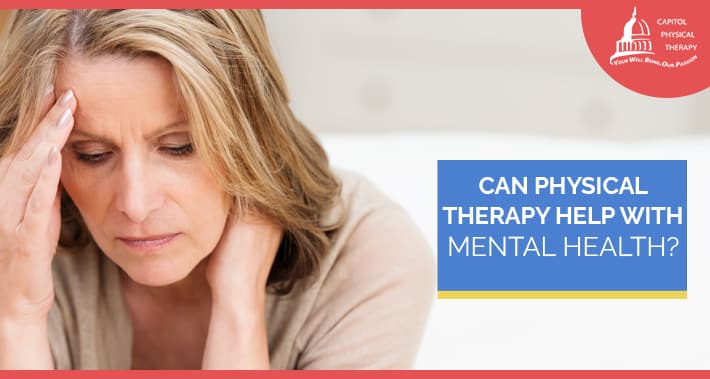
The medical field encompasses a wide range of specialties (and specialists) dedicated to a particular aspect of your health.
If you’re experiencing tooth, mouth, or jaw pain, you go see a dentist.
RELATED: Physical Therapy Treatments For TMJ Pain
If you’re having trouble speaking or communicating effectively, you go see a speech therapist.
If your vision is impaired, you go see an optometrist.
If you’re struggling with your mental health, you go see a psychotherapist.
And of course, if you’re dealing with chronic regional pain syndrome, sports and running injuries, or a number of other physical ailments, a physical therapist in Washington DC from Capitol Physical Therapy is your best bet.
When it comes to healthcare, it seems like there’s a lot of segmentation.
So, you can be forgiven for thinking your healthcare treatment must be segmented as well.
But there’s more overlap than it might seem.
Medical professionals, such as the ones we just mentioned, work together on a regular basis.
They also treat many of the same conditions and ailments.
After all, everything in our bodies is interconnected.
In particular, the connection between our physical health and our mental health is deeper than you might expect.
That’s why a physical therapist can be so beneficial for your mental health.
Let’s take a closer look.
What Is Depression?
Everyone feels a little sad from time to time.
However, depression refers to a type of mood disorder that causes a constant feeling of sadness which may be so intense that it causes you to lose interest in your hobbies and interests.
According to The American Psychiatric Association, depression is a serious illness which can lead to multiple emotional and physical complications that impair your ability to function at home, school, and work.
It’s not something that you can simply snap out of, but rather often requires the help of multiple experts and specialists.
Symptoms may include:
- Feeling sad, empty, or hopeless
- Experiencing anger, irritability, or frustration at minor stressors
- Lack of interest in hobbies or interests that were previously enjoyed
- Sleep issues, such as insomnia or chronic fatigue
- Sexual disturbances, such as lack of libido or erectile dysfunction
- Appetite changes, such as decreased appetite or increased cravings
- Anxiety, agitation, or restlessness
- Slower thinking, talking, and moving
- Feelings of worthlessness or guilt
- Cognitive impairments, such as brain fog and difficulty concentrating
- Unexplained physical ailments, such as migraines or body aches
- Suicidal thoughts or ideation
How Can Exercise Help Improve Depression And Mental Health?
When it comes to issues like depression, there are a number of different factors at play.
Depression is a complex mental disorder with a wide range of different possible causes and treatments.
As a result, there isn’t a “one size fits all” treatment for depression, and healthcare providers might offer a variety of possible solutions.
One of them is exercise.
RELATED: Why Is It Important To Warm Up Before Exercise?
It might seem like the last thing you want to do when you’re floating in the depths of depression, but physical activity has been shown to help manage symptoms of depression.
In a 2018 study by Murri et al, it was concluded that exercise is an effective method of depression treatment with fewer side effects than traditional psychiatric medications.
How does this work?
First, physical activity releases endorphins in your brain.
Endorphins are hormones your body releases as a result of certain activities.
These can include eating, having sex, making art or being creative, running, and other forms of exercise.
Their purpose is to make you feel good.
They reduce pain and increase pleasure.
So, you may not be surprised to hear that some cases of depression are associated with a deficiency in endorphins.
That’s why we often gravitate to activities that produce endorphins when we’re feeling down.
In particular, though, a lot of research has looked at the benefits of exercise for depression.
A 2004 paper by Craft and Perna took a look at a wide range of different studies from the 1960’s to the early 2000’s, and found that the vast majority showed benefit between exercise and depression.
Another study, this one from 2014 by Vancampfort, Morien, and Marchal, suggests that exercise can be just as effective as a pharmaceutical antidepressant for mild and moderate cases of depression.
Beyond this, exercise can help with depression by:
- Helping build your confidence
- Broadening your social opportunities
- Pulling you out of a depressive spiral

How Can A Physical Therapist Help With Mental Health?
The above information is great when it comes to exercise in general.
And of course, all physical therapy involves a certain amount of physical activity.
But physical activity is certainly not solely the domain of physical therapy.
What can physical therapy offer in terms of helping with depression that you couldn’t get from simply going for a run around the block?
Physical therapy can help with a wide variety of different physical ailments, including:
- Diastasis recti
- Hyperlordosis
- Runner’s knee
- Sciatica
- Osteoarthritis
- Fibromyalgia
- Scoliosis
- Chronic headaches
- Lower back pain
- Orthopedic health conditions
- Stroke recovery
- Carpal tunnel syndrome and other repetitive strain injuries
- And much more
For many of these conditions, pain management is a significant part of the approach.
RELATED: Physical Therapy Vs Opioids For Chronic Pain Relief
When dealing with issues related to physical pain, often the last thing you want to do is anything strenuous with your body.
This is especially the case where your condition restricts your mobility, like with Achilles tendon pain or pelvic pain.
As a result, ailments with physical health often have a mental health connection.
By removing the barriers that can stand in the way of your ability to exercise, physical therapy can make it easier for you to use exercise as a way to deal with your depression.
But the treatment itself has its benefits as well.
A 2012 study by Wideman, Scott, Martel, and Sullivan starts with the statistic that between a quarter and half of all physical therapy patients with orthopedic injuries have symptoms of depression along with them.
RELATED: Physical Therapy Injury Consultations
The study followed 106 different people diagnosed with orthopedic injuries and symptoms of depression through their seven weeks of physical therapy.
It found that 40% of the participants had their depressive symptoms resolved during their physical therapy treatments.
At the same time, there was a positive correlation between those with better improvement in their injury and those with better improvement in their mental health.
So, if you’re struggling with a physical ailment, it’s not surprising that you might be struggling with depression as well.
And while a physical therapist is not a mental health practitioner per se, we can still help you feel better, in body and mind.
Book Your Appointment With Capitol Physical Therapy Today
Are you dealing with depression along with a physical ailment?
If so, there is help.
At Capitol Physical Therapy, we have a team of professionals ready to help all of your health related concerns, whether they be mental or physical.
Book your appointment with Capitol Physical Therapy today to begin the journey to get your mind and body feeling their best.
1331 H St NW #200,
Washington, DC 20005
- https://g.page/capitolptdc
9560 Pennsylvania Ave. # 202,
Upper Marlboro, MD 20772
- https://goo.gl/maps/zjL4NnnuThRhrcS86
Capitol Physical Therapy offers orthopedic and other pain related solutions, with our versitile team of physical therapists in Washington, DC